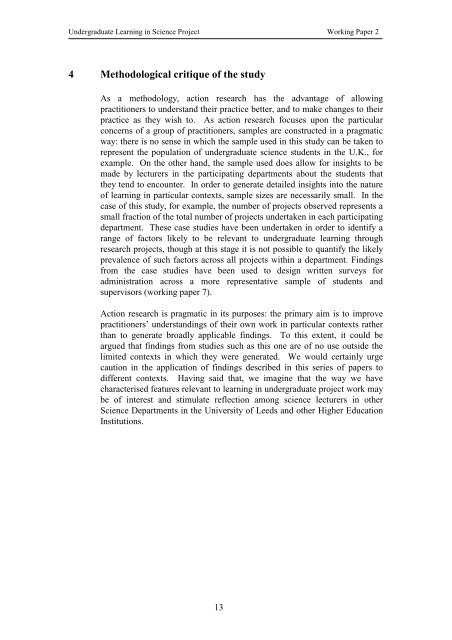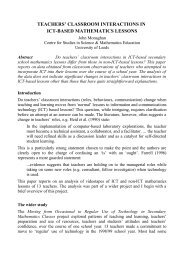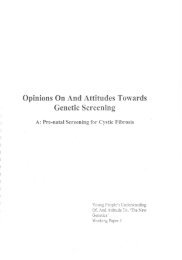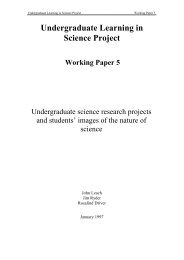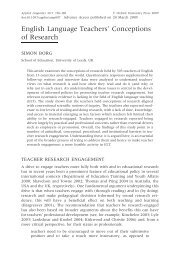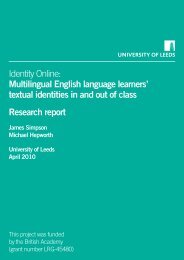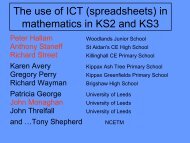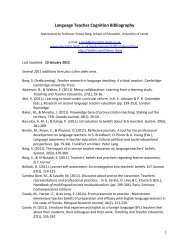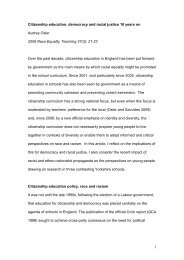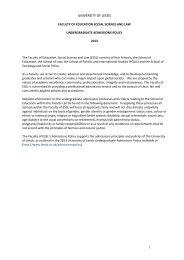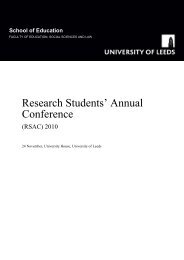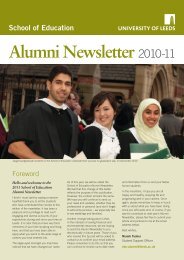The Research Project Study: Design and Methodology - School of ...
The Research Project Study: Design and Methodology - School of ...
The Research Project Study: Design and Methodology - School of ...
You also want an ePaper? Increase the reach of your titles
YUMPU automatically turns print PDFs into web optimized ePapers that Google loves.
Undergraduate Learning in Science <strong>Project</strong> Working Paper 24 Methodological critique <strong>of</strong> the studyAs a methodology, action research has the advantage <strong>of</strong> allowingpractitioners to underst<strong>and</strong> their practice better, <strong>and</strong> to make changes to theirpractice as they wish to. As action research focuses upon the particularconcerns <strong>of</strong> a group <strong>of</strong> practitioners, samples are constructed in a pragmaticway: there is no sense in which the sample used in this study can be taken torepresent the population <strong>of</strong> undergraduate science students in the U.K., forexample. On the other h<strong>and</strong>, the sample used does allow for insights to bemade by lecturers in the participating departments about the students thatthey tend to encounter. In order to generate detailed insights into the nature<strong>of</strong> learning in particular contexts, sample sizes are necessarily small. In thecase <strong>of</strong> this study, for example, the number <strong>of</strong> projects observed represents asmall fraction <strong>of</strong> the total number <strong>of</strong> projects undertaken in each participatingdepartment. <strong>The</strong>se case studies have been undertaken in order to identify arange <strong>of</strong> factors likely to be relevant to undergraduate learning throughresearch projects, though at this stage it is not possible to quantify the likelyprevalence <strong>of</strong> such factors across all projects within a department. Findingsfrom the case studies have been used to design written surveys foradministration across a more representative sample <strong>of</strong> students <strong>and</strong>supervisors (working paper 7).Action research is pragmatic in its purposes: the primary aim is to improvepractitioners’ underst<strong>and</strong>ings <strong>of</strong> their own work in particular contexts ratherthan to generate broadly applicable findings. To this extent, it could beargued that findings from studies such as this one are <strong>of</strong> no use outside thelimited contexts in which they were generated. We would certainly urgecaution in the application <strong>of</strong> findings described in this series <strong>of</strong> papers todifferent contexts. Having said that, we imagine that the way we havecharacterised features relevant to learning in undergraduate project work maybe <strong>of</strong> interest <strong>and</strong> stimulate reflection among science lecturers in otherScience Departments in the University <strong>of</strong> Leeds <strong>and</strong> other Higher EducationInstitutions.13


